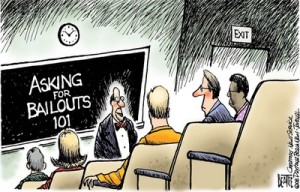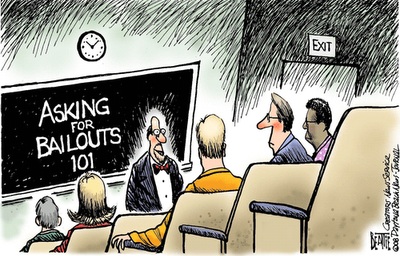 It should come as no surprise that politically connected banks received larger bailout loans from the federal government during the 2007 financial crisis than banks that spent less on lobbying and campaign contributions. That’s the conclusion of a new analysis by Prof. Benjamin Blau of Utah State University. His findings were based on data from the Federal Reserve and published by the Mercatus Center at George Mason University.
It should come as no surprise that politically connected banks received larger bailout loans from the federal government during the 2007 financial crisis than banks that spent less on lobbying and campaign contributions. That’s the conclusion of a new analysis by Prof. Benjamin Blau of Utah State University. His findings were based on data from the Federal Reserve and published by the Mercatus Center at George Mason University.
Blau noted it was “unlikely” that the Fed intended “to provide political favors to banks with the most political connections.” But whatever the motive, the pattern was stark. Banks that received bailout loans spent 72 times more on lobbying in the decade before the meltdown than banks that got no loans. Blau also found that 15 percent of the banks that received loans employed politically connected individuals. Only 1.5 percent of banks with politically connected employees got no loans.
There are three potential reasons for the skew, as Blau indicates:
1. The Fed may simply have had more information on the politically active banks, which would have made it easier to approve the loans.
2. The politically active banks were probably more likely to seek Fed loans.
3. Because of their political sophistication, these banks may have taken greater risks believing they would be rescued by the Fed if anything went wrong.
Following the 2007 crisis, Congress passed Dodd-Frank, a massive tome of a bill that Americans were told would prevent a repeat of the financial meltdown. In fact, Dodd-Frank all but guarantees that big banks stay big and small banks struggle to compete. “Dodd-Frank has not done enough to coral ‘too big to fail’ banks and, on balance, the act has made things worse, not better,” said Richard Fisher, president of the Federal Reserve Bank of Dallas.
Fisher’s preferred solution was to break up the banks, but California Republican Rep. John Campbell introduced a bill that would require banks with $50 billion or more in assets to hold favor safer assets like long-term bonds. Doing that would help balance the banks’ books while reducing the risk to taxpayers of another meltdown. But President Obama isn’t likely to add Campbell’s measure to his list of signature “accomplishments.”
By implying that some banks are “too big to fail,” Dodd-Frank ensures a revolving door of back-scratching political activity between Wall Street and the government. These banks spend millions on lobbying federal legislators and regulators, so odds are they can count on government assistance during times of trouble. That encourages the largest banks to take unwise risks, knowing that American taxpayers provide a security blanket.
. . . . . . . . . . . . . . .
This article was written by an editorial writer for the Washington Examiner.
